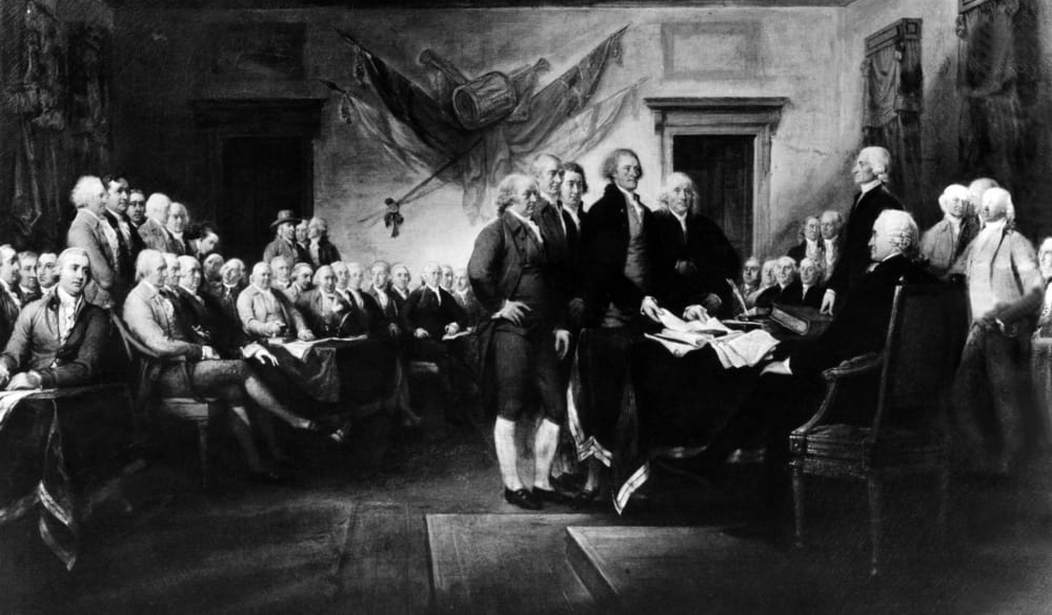Two hundred forty-one years ago today (yes, today, July 2), 56 very courageous men passed a resolution (officially promulgated two days later) dedicated to liberty, which they ended thusly: “With a firm reliance on the protection of Divine Providence, we mutually pledge to each other our lives, our fortunes, and our sacred honor.” They did so, they had written, while “appealing to the Supreme Judge of the World for the rectitude of our intentions,” to defend rights to which they are “endowed by their Creator.”
These were not irreligious men.
The appeals to a single God were not mere rhetorical flourishes. They were heartfelt expressions of both faith and duty, made with a firm belief that, as the second-most-active author of the Declaration was to say at another historically fraught conference 11 years later, “God governs in the affairs of men.”
They were declaring the independence of a nation whose most famous early settlers began their foundational document “in the name of God: Amen….Having undertaken, for the Glory of God, and advancements of the Christian faith and honor of our King and Country, a voyage to plant the first colony in [what became Massachusetts]….”
Yet there are those who spread the falsehood that the nation founded by these people was intended to be hostile to faith in the public square.
This is nonsense.
There is a straight line of reverence for one true God that runs from the settlers writing the Mayflower Compact to the patriots of liberty declaring independence from the mighty British Empire, and from thence to the statesmen who hashed out the Constitution of the new United States. How do we know that the Constitution’s framers, too, thought faith essential to a successful polity, even though that document originally made no mention of God? Because not only was the Declaration’s second-leading author, Ben Franklin, also influential at the Constitutional Convention (wherein he noted at a key point that God governs men’s affairs), but the Constitution’s most influential catalyst and advocate, James Madison, drafted the first and most famous amendment to that Constitution.
That amendment not only guaranteed the “free exercise of religion” — the absolutely essential provision that anti-religionists conveniently ignore — but also, in its first clause, guaranteed that government would not “establish” any particular sect. There are those who are uninformed who mistakenly think the anti-establishment clause is hostile to faith. That’s wrong. Madison based that clause (indeed both clauses on religion) on his own work on the 1776 Virginia Declaration of Rights, whose final, key guarantee of religious liberty was worded specifically via his own amendment at that legislature in Williamsburg. And why had Madison become such a passionate advocate of free religious exercise? It wasn’t on behalf of atheism or agnosticism; it was in reaction to mistreatment of Virginia Baptists who wanted to celebrate their faith. He too wanted them to be able to openly practice their religion, not just in private but in public.
Madison was later to attest that “Belief in a God All Powerful wise and good, is so essential to the moral order of the World and to the happiness of man, that arguments which enforce it cannot be drawn from too many sources.”
Again, these were not men hostile to faith in the public square. They were hostile to any restrictions on faith in the public square; what they wanted was a public square that encouraged active expression of the faiths of all denominations. Their God was the Judeo-Christian God, and their belief in individual rights grew directly from the Judeo-Christian tradition that each individual human is given intrinsic worth, by God, that no government can take away.
Freedom was not in conflict with their faith; their conception of freedom grew from their faith.
As Christians, we believe with St. Paul (in today’s reading from the Revised Common Lectionary) that we are “free in regard to righteousness.”
We are to use that freedom, in other words, to do good.
As we celebrate Independence Day, let us recognize that God’s influence on our founders was crucial, and thank God for our freedom.
Quin Hillyer is a veteran conservative columnist with a degree in theology. His faith-themed satirical novel, Mad Jones: Heretic, is due for publication this summer by Liberty Island Media.









Join the conversation as a VIP Member